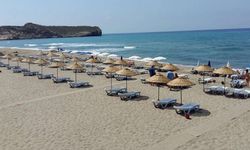The Türkiye tourism sector, tested by various developments ranging from geopolitical events to earthquakes, economic crises, international tensions, and elections, fell short of expectations in 2023, despite entering the year with high hopes.
President of Türkiye Hoteliers Federation (TÜROFED) Erkan Yağcı stated that there are many reasons why the tourism sector lags behind expectations in 2023.
Stating that there are many reasons for Türkiye to fall behind its 2023 targets, Yağcı listed these reasons in 11 items:
1. The earthquake disaster we experienced on February 6th was the most significant disruptor of this year's dynamics. As it is known, early reservations intensify after the New Year and continue until mid-March. The occurrence of the earthquake during that period, in our estimation, led to a portion of reservations shifting to other destinations. We believe that especially pre-season reservations for April, May, and June, as well as some peak season reservations, moved to different destinations.
2. People who couldn't go on vacation in 2020 and 2021 rushed to travel in 2022 when borders opened and quarantine measures were lifted. The "Revenge holiday" played a fundamental role in achieving high occupancy at good prices for hotels in 2022. However, as we entered 2023, we noticed that the impact of the "revenge holiday" effect had diminished this year.
3. In 2023, we are experiencing a season where all destinations are open, each destination receives its own guests, and intense competition prevails. In other words, Spanish tourists are going to Spain, Greek tourists to Greece, and Italian tourists to Italy.
4. The fourth reason is the inflationary environment worldwide, economic hardships, and the decrease in people's purchasing power. This situation is not unique to our country; it's a global phenomenon.
5. Another factor that negatively impacting 2023 season is the Russia-Ukraine war. We should consider the geopolitical tensions and economic difficulties caused by the war, especially the impact on Russia's economy. It's not just about price increases; compared to last year, the ruble has lost 60-70% of its value against the dollar and euro.
6. The inflationary environment in Türkiye should also be considered as another factor affecting hotel prices.
7. Global recession and the decrease in purchasing power.
8. The increase in airplane costs.
9. The impact of the elections in June on business and conference tourism.
10. The increase in airplane costs is also a significant factor causing an increase in package costs.
11. The impact of non-hotel accommodations (daily rental houses) outside of hotels.
"We can't attribute all difficulties to a single factor."
Erkan Yağcı responded the question about the impact of daily rental homes on the occupancy of hotels and stating, "There isn't a study that indicates daily rental homes are a global trend. Non-hotel accommodations have been around for years; it's a practice rooted in the past. There are many factors that influenced the 2023 season, and rental homes are just one of them. This model is a part of the market."
"Not only hotels and flights, but prices of all products have increased worldwide"
Despite all of this, Yağcı noted that Turkey's tourism had shown growth after six months, saying, "We see a tourism potential approaching or even surpassing 2019, but it's not an easy year. This difficulty stems from factors both within and outside the sector, including geopolitical and economic developments that affect tourism demand. Therefore, we can't attribute the state of demand solely to price increases. Because hotel prices have increased all around the world, and this rise is not due to demand but to an inflationary environment. It's not just hotel and flight prices; the prices of all products have increased worldwide."
"For the first time, we've reached Spain in average price"
Regarding the assessment that "Turkish hoteliers' excessive price increases driven by their confidence from the 2022 season led to a drop in demand in 2023," Erkan Yağcı had this to say:
It's challenging for me to make an assessment about price strategies of individual hoteliers but I can say this: This year, we were very good in terms of the balance between price and service. This year, Turkey has come close to Spain in terms of average price level, perhaps for the first time in history. This is not a bad thing. Hoteliers were told for years that they were pricing their product too cheaply. Hoteliers in Türkiye are currently fighting this battle. We are trying to get the fair value for our product, but a 3-star hotel should be sold at a 3-star price, and a 5-star hotel should be sold at a 5-star price."
"It should be 90 percent full, but with realistic prices."
According to Yağcı Türkiye needs smart strategies to boost tourism. "During the pandemic, we learned this: your hotel doesn't need to be 100 percent full during the high season. Let it be 90 percent, but with a realistic prices, and let the guests be satisfied as well. We should always operate with a focus on good service, high guest satisfaction, and a sustainable approach to tourism."






